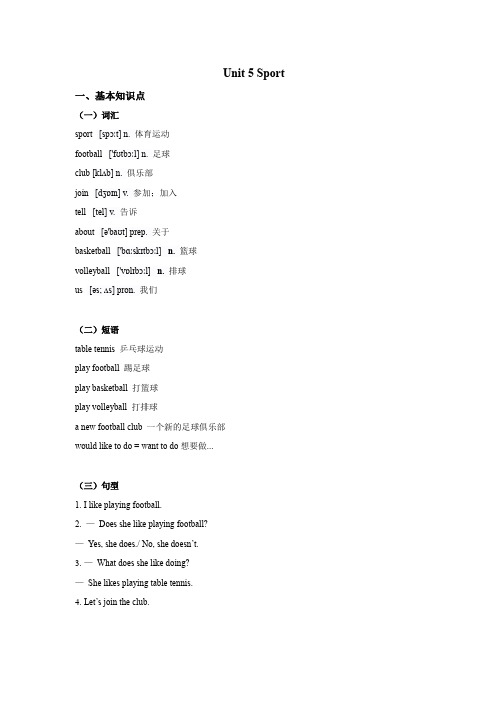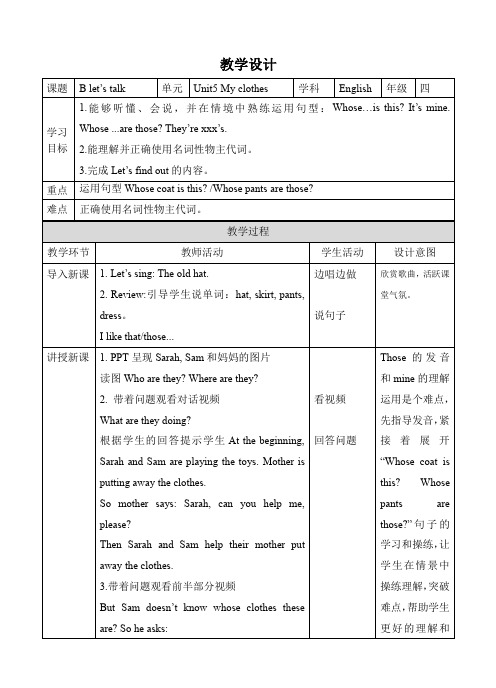四年级下册unit5B
- 格式:pptx
- 大小:4.23 MB
- 文档页数:11


Unit Four At the farmLesson 2Teaching aim:1.Grasp the sentences: What’ his name? His name is…He has…And try to usethem in the practice sense.2.Know something about : When a friend gives you a present ,open it and say“Thank you”.Difficulties and importance:1.Grasp the sentences: What’ his name? His name is…He has…He’s…too.2.Culture.Preparation:1.Some pictures of famous people.2.Recorder and tape.Steps:(1) Warm-up.a.Everyday exercise.b.Game: Guess the name “What’s his/her name? Who’s she/he?”(2) Presentation.a.Ask a student: What’s your name? My name is…Ask the class: What’s his name? His name? Who’s he?Use this form, let pupils learn the sentence: What’s her name?b.Try to practice the dialogue.What’ his name? His name is…What’ her name? Her name is…c.Show the picture of ZhangPeng:Look at the photo. Look at the picture.What’ his name? He’s tall.He’s strong,too.(3) Listen and read.a. Listen to the tape and catch the main idea.c.Read the passage after tape or after me.d.Game:Let’s guess(4) Culture.When a friend gives you a present ,open it and say “Thank you”年级课时教学设计。

Unit 5 Sport 一、基本知识点(一)词汇sport [spɔːt] n. 体育运动football ['fʊtbɔːl] n. 足球club [klʌb] n. 俱乐部join [dʒɒɪn] v. 参加;加入tell [tel] v. 告诉about [ə'baʊt] prep. 关于basketball ['bɑːskɪtbɔːl]n. 篮球volleyball ['vɒlɪbɔːl]n. 排球us [əs; ʌs] pron. 我们(二)短语table tennis 乒乓球运动play football 踢足球play basketball 打篮球play volleyball 打排球a new football club 一个新的足球俱乐部would like to do = want to do想要做...(三)句型1. I like playing football.2. —Does she like playing football?—Yes, she does./ No, she doesn’t.3.—What does she like doing?—She likes playing table tennis.4.Let’s join the club.(四)重难点、易错点1. play + 球类运动表示“打...; 踢... ”, 注意积累球类运动的词汇2. 学习动词的用法:like to do/ doing sth 喜欢做某事want to do sth 想要做某事let sb do sth 让某人做某事tell sb about sth 告诉某人关于某事3.含有实义动词的肯定句变一般疑问句和特殊疑问句二、典型例题1. ________ Alice like playing football?A.DoB. DoesC. Is2.I like ________ basketball.A.playsB. playC. playing3.Let’s ________ the music club.A.joiningB. joinsC. join4. — Does he like playing the volleyball club?— Yes, ________.A.he likeB. he likesC. he does三、变式习题基础题(一)词汇运动football打篮球关于tellus打排球(二)对话匹配( ) 1. Does Peter like playing table tennis? A. She likes walking.( ) 2. Would you like to come with me? B. Yes, he does.( ) 3. What lessons do we have today? C. Sure.( ) 4. What does she like doing ? D. We have Art, English and Maths. ( ) 5. What subjects do you like? E. I like Maths.提高题(一)单项选择( ) 1. Alice is my friend. I like volleyball. She ________ volleyball, too.A. likeB. likesC. liking( ) 2. They like _______ football in the playground.A. playsB. playC. playing( ) 3. My favorite subject is Art. What ________ you, Kitty!A.forB. toC. about( ) 4. San and I want ________ the club.A. to joinB. joinC.joining( ) 5. —What’s your favorite subject?—My favorite subject is PE because I can ________ in PE class.A. draw a pictureB. play the violinC. play table tennis(二)连词成句1.that’s, idea, a, good (!)_______________________________________________________________2.she, playing, does, like, football(?)_______________________________________________________________3.join, let’s, club, the (.)_______________________________________________________________4.you, want, go, do, with, to, us (?)_______________________________________________________________强化题(一)用所给词的适当形式填空。


Unit 5 My clothesPart A第一课时一、将下列句子改成一般疑问句,并做肯定和否定回答。
1.This is my jacket.______________________________________2. These are my shoes.______________________________________3. This is a hat.______________________________________4. Those are John’s shoes.______________________________________二、用所给词语的恰当形式填空。
1.—Are these_______(your)? —Yes, they are.2.—Is this John’s? —No, it’s_______(Mike).3. My______(shoe) are white.4. They’re______(Chen Jie).三、选择合适的句子补全对话。
A: What time is it?A: Peter, is this yours?B: 2.__________ My hat is red. It’s Amy’s.A: 3.__________C: Yes, it is.A: Here you are.C: 4._________答案:一、1. Is this your jacket? Yes, it is./No, it isn’t.1.Are these your shoes? Yes, they are./No, they aren’t.2.Is this a hat? Yes, it is./No, it isn’t.3.Are those John’s shoes? Yes, they are./No, they aren’t.二、1. yours 2. Mike’s 3. shoes 4. Chen Jie’s三、1.C 2.A 3.B 4.DUnit 5 My clothesPart A第二课时一、将单词与对应的图片连线。

四年级下册英语第五单元课文Unit 5 My clothes 我的衣服Whose are these? 这些是谁的?They're John's. 乔恩的。
Whose cap is this? 这是谁的帽子?It's my brother's. Thanks. 我弟弟的。
谢谢。
Where are you, Zip? 你在哪,吉普?Is this yours? 这是你的吗?Yes. Thank you. 是的,谢谢。
A Let's talk 一起说吧OK. It's four o'clock. It's time to go home. 好。
四点了。
该回家了。
Amy, are these yours? 艾米,这些是你的吗?No, they aren't. My shoes are green. They're Chen Jie's. 不,不是。
我的鞋是绿色的。
它们是陈洁的。
What about this hat? Is this John's? 这顶帽子呢?是乔恩的吗?No, it isn't. It's Mikes. 不,不是。
是迈克的。
A Let's learn 一起学吧I like that green skirt. 我喜欢那条绿色的裙子。
Me too. And I like those pants. 我也是。
我还喜欢那条裤子。
clothes 衣服hat 帽子skirt 裙子pants 裤子dress 连衣裙A Let's do 一起做吧Put on your skirt. 穿上你的裙子。
Hang up your dress. 挂上连衣裙。
Take off your hat. 脱掉帽子。
Wash your skirt. 洗裙子。
Put away your pants. 把裤子拿走。
【 - 小学作文】篇一:《人教版四年级下册英语unit4B部分翻译》人教版四年级下册英语unit4教材B部分课文翻译 1Let's talk部分翻译Mike:Wow! You have a lot of animals!What are those?迈克:哇!你有许多动物!那些是什么?Man:They're horses.男人:它们是马。
Mike:Cool!How many horses do you have?迈克:太酷了!你有多少匹马?Man:Mmm... Seventeen.男人:嗯……十七匹。
Sarah:What about those? Are they hens?萨拉:那些呢?它们是母鸡吗?Man:No,they aren't. They're ducks.男人:不,它们不是。
它们是鸭子。
2Let's play部分翻译cat:meow猫:喵喵叫duck:quack鸭子:嘎嘎叫dog:woof狗:汪汪叫hen:cluck母鸡:咯咯叫cow:moo奶牛:哞哞叫horse:neigh马:嘶嘶叫What are those?{人教版四年级下册英语unit,five教材b部分课文翻译}. 那些是什么?Are they horses?它们是马吗?Yes,they are.是的,它们是。
3Let's learn部分翻译4Draw and say部分翻译Chen Jie:This is my farm.陈杰:这是我的农场。
Amy:lt's big.Are these...?埃米:它很大。
这些是……吗?Chen Jie:Yes,they are.陈杰:是的,它们是。
5read and write部分翻译Read and tick(√).读一读并打钩。
Hi! This is Mr MacDonald's farms.Let's have a look!嗨!这是麦克唐纳先生的农场。
四年级下册英语教案-Unit 5《What will you do this weekend》(Lesson 28)|人教(精通)教学目标1.能够听懂并会说本课对话内容2.能够使用英语表述自己的周末安排3.能够根据图片和句子判断周末活动教学重点1.能够听懂并会说本节课对话内容2.能够使用英语表述自己的周末安排教学难点1.能够根据图片和句子判断周末活动2.能够结合实际情况进行表达教学准备1.课件2.朗读MP33.图片及相关词汇4.游戏道具教学课程安排1.自我介绍(5分钟)教师自我介绍并要求学生用英语介绍自己的名字、年龄、爱好等。
2.学习新知识(20分钟)(1)学习重点词汇展示相关图片,让学生看图说词,并简单听读练习,如 skateboarding, painting, swimming, hiking。
(2)教授新知识1.师生对话(1)T:What will you do this weekend, Amy?S:I will go swimming.T:Great! Will you go with your friends?S:Yes, I will.运用听力MP3让学生模仿26遍以上,并自由组合训练。
2.师生对话(2)T:What will Sam do this weekend, Amy?S:He will go to the movies.T:Will he go alone?S:No, he won’t. He will go with his family.抓住重点的会话内容,积极训练口语能力。
(3)活动安排(1)小组活动以学生安排周末活动为切入点,让学生自由组成小组,展开问答并模仿。
(2)游戏形式利用卡片、关键词等游戏道具,进行互动和角色扮演,提高口语交际能力。
3.教师扩展及作业布置(10分钟)(1)扩展活动请学生描述他们新研究的活动,并结合时间、地点等因素进行讨论,以提高他们的口语表达能力。
四年级下册英语第五单元b部分Unit 5 of the fourth grade English textbook covers a variety of topics that are essential for students to learn and practice. In this unit, students will focus on the "b" part, which includes learning about the days of the week, telling time, and talking about daily routines.Firstly, students will learn the names of the days of the week in English. It is important for students to memorize the days of the week as they are commonly used in daily conversations. Teachers can use flashcards, songs, and games to help students remember the names of the days of the week. Students can also practice spelling and pronouncing the days of the week to reinforce their learning.Secondly, students will learn how to tell time in English. They will learn how to read the hour and minute hands on a clock, as well as how to say the time in English. Teachers can use visual aids such as clock worksheets, interactive games, and real clocks to help students practice telling time. Students can also practice asking and answering questions about the time to improve their speaking and listening skills.Lastly, students will learn how to talk about their daily routines in English. They will learn common phrases and vocabulary related to daily activities such as waking up, brushing teeth, eating breakfast, going to school, and doing homework. Teachers can help students create a daily routine chart to practice using the vocabulary and phrases they have learned. Students can also work in pairs or groups to role-play different daily routines to improve their communication skills.Overall, the "b" part of Unit 5 in the fourth grade English textbook is a valuable resource for students to learn and practice essential English skills. By focusing on the days of the week, telling time, and daily routines, students will be able to improve their vocabulary, grammar, and communication skills. Teachers can use a variety of teaching strategies and activities to engage students and help them master the content of this unit. With practice and reinforcement, students will be able to confidently use English to talk about their daily lives and routines.。